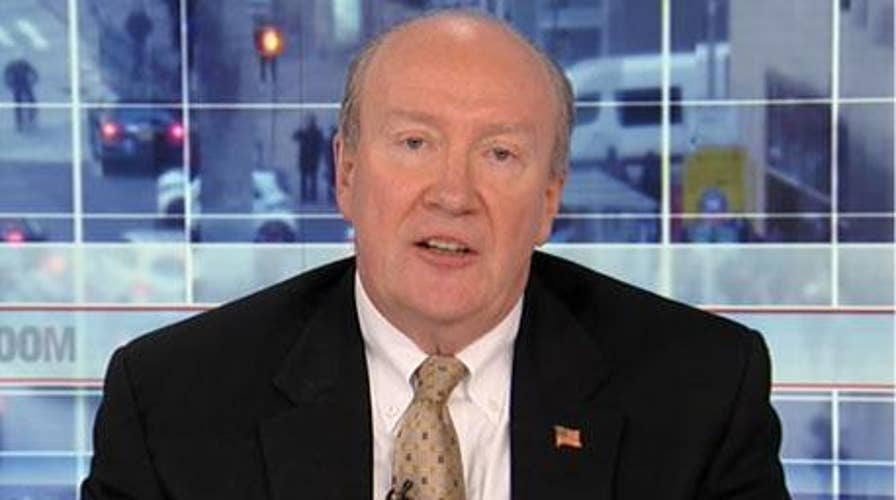Andy McCarthy analyzes IG Report findings
Andy McCarthy, former Assistant U.S. Attorney, provides analysis to the Inspector General's findings into the FBI's handling of the Russia probe
At Wednesday’s Senate Judiciary Committee hearing about Justice Department Inspector General Michael Horowitz’s report on investigative abuses in the FBI’s Trump-Russia investigation (codenamed “Crossfire Hurricane”), Democrats continued an effort begun ten days ago to hoodwink the public into believing Horowitz is in a bitter dispute with Attorney General William Barr over a key finding in the report.
The dispute allegedly stems from what is portrayed as Barr’s dissent from the IG’s conclusion that the probe was properly predicated – i.e., that there were sufficient factual grounds to open an investigation of whether the Trump campaign was complicit in the Kremlin’s cyberespionage attack on Democratic party email accounts.
In point of fact, as discussed in my Fox News Opinion column on Wednesday, the two men have less a difference of opinion than a difference in focus – the distinction between what may be done and what should be done.
ANDREW MCCARTHY: THE FBI, THE IG REPORT, AND ATTORNEY GENERAL BARR – SEPARATING FACT FROM FICTION
I’m tempted to say there is no real dispute, but let’s leave it at saying the dispute is wildly overstated.
A cautionary note: People should be suspicious about media coverage of the attorney general. For decades, Bill Barr has enjoyed a well-earned reputation for legal acumen and personal integrity. But he is now working for Donald Trump.
Hence, there has for months been an energetic media-Democrat effort to discredit him – in particular, to undermine the investigation he has appointed Connecticut U.S. attorney John Durham to conduct into the origins of the Trump-Russia probe (not just Crossfire Hurricane, but the related investigations involving other domestic and foreign government agencies).
A transparent motivation fuels this effort: The Mueller probe found no evidence of a Trump-Russia conspiracy, notwithstanding the indefatigable “collusion” narrative (explored at length in my book "Ball of Collusion").
Now the Horowitz IG report has found major abuses in the FBI’s investigation of Trump. The question naturally arises: Why did the Obama administration use the intelligence and law-enforcement apparatus of the government to investigate its political opposition?
Democrats and their media confederates are determined to protect Obama’s legacy from Nixonian taint. Barr, therefore, must be subjected to character assassination.
The specter of political spying, that bane of the Watergate era, is manifest. That is what Barr and Durham are exploring.
Democrats and their media confederates are determined to protect Obama’s legacy from Nixonian taint. Barr, therefore, must be subjected to character assassination.
You know the drill: He is Trump’s lawyer, not America’s. His investigation is politicized, not in good faith and so on.
Yes, the same people who lionized Mueller’s team of partisan Democrats, now feign outraged disbelief at the suggestion that the FBI could possibly have been just a tad political.
That would be the same Bureau that helped whitewash the Clinton emails caper; scorched the earth to find a non-existent conspiracy against Trump; brought us the charming Strzok-Page texts; and has, in just the last two years, been the subject of not one but two voluminous IG reports examining the anti-Trump animus of top investigators.
That is why the Barr-Horowitz contretemps must be exaggerated.
Typical of IG reports, Horowitz’s latest features admirably comprehensive fact-finding but conclusions framed in lawyerly gobbledygook that lend themselves to easy distortion.
As night follows day, the anti-Trump forces pounced: We’re to believe the IG concluded that the Trump-Russia investigation’s commencement was unimpeachable and that there was no political bias in the FBI’s decision-making.
That is not what Horowitz actually said. Since it is important that the public be given accurate information about the Justice Department’s position, the AG has spoken out to clarify what the IG concluded and how DOJ regards these conclusions.
In press coverage, this has been portrayed as a blistering attack on Horowitz.
At Wednesday’s hearing, Senate Judiciary Committee Democrats picked up the theme: Horowitz heroically struggles to uphold the rule of law and standards of impartial fact-finding, but Barr, that diabolical Trumpkin, is determined to bring him down for refusing to brand Crossfire Hurricane a hoax.
Even as this narrative first took wing, there was a clue that it was deceptive, though you had to dig a little to find it.
On December 2, a week before the IG report became public, the Washington Post kicked off the Barr vs. Horowitz tale with a story claiming, based on anonymous sources, that the AG was disputing the IG’s “key” finding that the FBI had enough information to justify launching the probe.
Seven paragraphs in, though, there was an on-the-record statement from a named official: Kerri Kupec, Barr’s spokeswoman. Far from conveying rancor, Ms. Kupec issued a gushing tribute to Horowitz. His investigation, she said: “Is a credit to the Department of Justice. His excellent work has uncovered significant information that the American people will soon be able to read for themselves. Rather than speculating, people should read the report for themselves next week, watch the Inspector General’s testimony before the Senate Judiciary Committee, and draw their own conclusions about these important matters.”
CLICK HERE TO GET THE OPINION NEWSLETTER
Yes, that’s right. In relating the supposedly intense infighting over the report between Barr and Horowitz, the Post was compelled to note that the only statement traceable to Barr was an enthusiastic endorsement of Horowitz’s work and an encouragement to Americans to read the report and watch the testimony.
What a scurrilous attack!
When Horowitz finally released the report on Monday, Barr himself made a statement. Relying on the IG’s work, rather than contradicting it, the AG observed that the FBI had, “launched an intrusive investigation of a U.S. presidential campaign on the thinnest of suspicions that, in my view, were insufficient to justify the steps taken. [Emphasis added.]
Barr did not disagree with Horowitz on the commencement of the investigation. Horowitz had found that the FBI’s written procedures provide a very low bar in terms of the suspicion that may justify the opening of an investigation.
Barr did not dispute this; he said the investigation was opened “on the thinnest of suspicions.” That is both true and, as Horowitz points out, sufficient.
More from Opinion
- Andrew McCarthy: Trump impeachment articles are weak – they range from insignificant to implausible to inane
- Tucker Carlson: IG report is a big, big problem for CNN, others – They are exposed as liars and know-nothings
- Leslie Marshall: Democrats want to impeach Trump because they are patriots – not for political reasons
Barr thinks it was unwise to open so significant an investigation on such thin evidence. Horowitz is not claiming it was prudent; he is saying the regulations permitted it.
More to the point, Barr’s beef was less with the opening of the investigation than with “the steps taken” after the investigation was opened.
This, plainly, is a reference to the use of intrusive investigative techniques – in particular, confidential informants and FISA surveillance warrants.
Barr’s point is that, given the norm against permitting the incumbent government’s investigative powers to intrude on our political process, it was wrong to use such aggressive tactics given the threadbare basis for suspicion.
CLICK HERE TO GET THE FOX NEWS APP
Horowitz is not disputing that. He is saying that it is not his place to second-guess discretionary judgment calls about investigative tactics as long as the probe is legitimately opened. And clearly, the IG report is a testament to the abuse of those tactics: the misrepresentations to the FISA court, and the fact that, although the use of informants generated exculpatory evidence, the Bureau inexplicably continued investigating a U.S. political campaign.
“Fake News” is an overused and oft-abused term. In the case of the reported Barr vs. Horowitz controversy, however, it might just be apt.











































